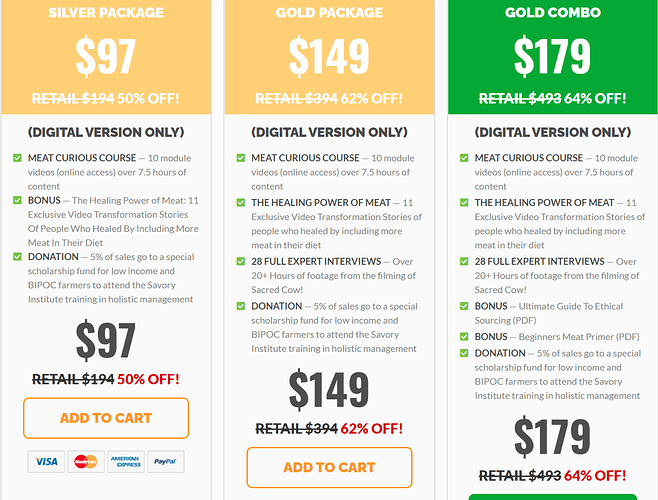https://www.sacredcow.info/ - 80 minute video, sign up with your first name and email to watch it between now and Sunday only for free.
https://vimeo.com/435357655 (trailer)
The Case for Better Meat
At our grocery stores and dinner tables, even the most thoughtful consumers are overwhelmed by the number of considerations to weigh when choosing what to eat—especially when it comes to meat. Guided by the noble principle of least harm, many responsible citizens resolve the ethical, environmental and nutritional conundrum by quitting meat entirely. But can a healthy, resilient and conscientious food system exist without animals?
Sacred Cow probes the fundamental moral, environmental and nutritional quandaries we face in raising and eating animals. In this project, we focus our lens on the largest and perhaps most maligned of farmed animals, the cow.
Although this is a fairly valuable film, I will point out that there is a definite bias in this film, including the presentation of unbalanced and misleading information but it is, on the whole, a useful documentary to watch because it teaches the public about the dangers of a vegan diet, commercial farming using manmade chemicals (pesticides, herbicides, fungicides, nitrogen, phosphorus, etc.), and monocrop fields, among other things. It also loosely shows what regenerative farming/ranching is, and how it’s vital for restoring the viability of arable and marginal agricultural land, as well as the future of food production, and a more ethical way to raise livestock. Further, it generically talks about the ethics of slaughterhouses and that they need to change, but didn’t really give specifics.
Not enough of a summary? Here’s more.
One area in which the film had a bias was because several people were paleo diet advocates (including Mrs. Rodgers), so their view of things is just as skewed as the former vegan’s had been previously. This led to lumping together meat and fat into certain statements that gave an inaccurate understanding to the viewers. There are some studies that indicate a definite relationship between excessive beef (and pig) consumption and colorectal cancer.
Another area was when the owner of Polyface farms was talking about the fake meat industry’s use of processed plants to create their “meat”, and how they use manmade chemicals and commercially-grown crops. By saying that, he implied that this is not the case for commercially-raised livestock, which is massively untrue. Where does all the feed for those lots crammed full of livestock with no grass growing come from - outer space? The same food used to create fake burgers is what livestock eat (or, worse, they eat a nutritionally imbalanced meal, like corn, which produces livestock that are potentially detrimental to our health), and what is used for fake burgers is BY ORDERS OF MAGNITUDE less than what is used for commercial ranching. In addition, the volume of water used by most types of farming is FAR less than for ranching, again by a large degree. Finally, while commercial crop production introduces a lot of chemicals into the ecosystem, air and water, that is basically all they do - use water, kill the soil, erode the soil, which goes into seas, oceans, and lakes via waterways, poison everything, and use a fairly proportional amount of land and water. Commercial ranching, in sharp contrast, does ALL of that plus uses huge volumes of water, pollutes land, air and water
While it is true that processed foods are, in general, worse for health than whole/unprocessed foods, some foods MUST be processed to be able to extract the most benefits from them. Seeds cannot be digested unless the hull is cracked or removed. Some vegetables are much more bio-available when cooked. Meat is generally easier to digest when cooked. And, if processed food is made to nutritionally (not just appearance, taste, smell and texture) mimic what it’s replacing, that means that it will be a suitable replacement. Beyond, Impossible, Emerge, Lightland, NotCo and other meat substitute companies, however, are not necessarily aiming at a similar nutritional profile, or even one that is good for health, so it’s important to keep that in mind.
Although the film talks about how some supplements contain versions of vitamins and minerals that are less bioavailable, it failed to mention that people with a good diet don’t usually need them, and it also failed to mention that supplements can be dangerous if they contain excessive levels of nutrients when combined with your diet. Anecdotally, I have experienced this while consuming the multi-vitamin Centrum. I took a pill and started to feel lethargic and unwell. I discovered that if I consumed half a pill, the effect stopped. Ultimately, though doctors don’t generally recommend multi-vitamin supplements BECAUSE they are not geared to what is actually deficient in your diet.
One question that I had was when the methane guy was talking. He said that it’s a falsehood that cows contribution of CH4 (methane) to the atmosphere is a problem because it’s part of the precipitation system. That may be true but, as ranching ramps up, the sheer VOLUME of cow (and other livestock) farts increases, leading to a net increase of methane in the air which, in turn, affects the climate, including local and global temperatures, and weather patterns. Finally, he provides no solid facts about the volume of CH4 produced, or its impact in those 10 years it’s in the air.
After the film, it offers you access to bonus materials (including the full versions of the 20 interviews in the film), a self-paced, 10-module, 7.5±hour course, and the Sacred Cow book - all for sale, of course. They’re also looking for funding, which partially comes from sales.
(
https://access.sacredcow.info/meat-curious/)
So, you have to take the good with the bad with this film, and educate yourself. If you have questions, please let me know.
#diet #nutrition #health #cows #bovines #ruminants #ranching #agriculture #farming #regenerativefarming #filmreviews #documentary #environment #ethics



